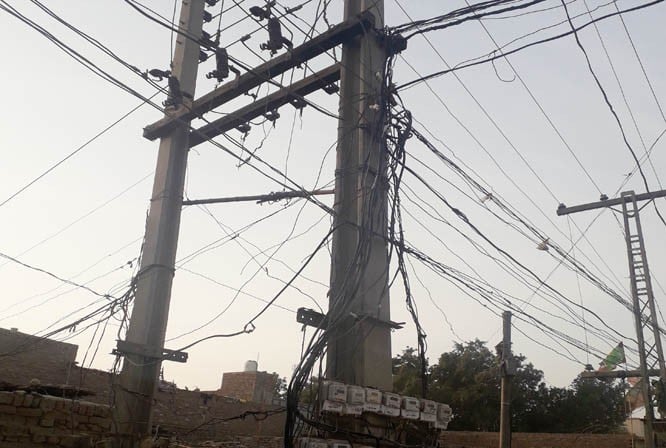
People of rural Sindh complain of 8 to 16 hours of loadshedding everyday as a routine. Is there a way out for them?

Rajanpur in northern Sindh comprises no more than 250 houses but only 25 of them have electricity metres installed. Only a few pay monthly bill, most are either involved in electricity theft or giving bribe to the staff of the power supply company.
Rajanpur near Ubauro town of district Ghotki is a microcosm of what’s wrong with the power supply in rural Sindh. People complain about 8 to 16 hours of power outages in winters but the officials of the power supply company explain this often-random outbreak in the supply of power is for a reason -- the consumers do not pay their monthly bills.
A walk through the dusty lanes of the village shows that most of the electricity metres are not functioning. They are just there, perched on polls and walls, to at best expose a web of corruption of the power sector.
"We are facing the worst kind of loadshedding in the winter season when airconditioners are off," says Karim Dino who runs a small shop in Rajanpur. He regularly pays the monthly bill from his low income. "The local influentials steal electricity by bribing Sepco officials."
Sukkur Electric Supply Company (Sepco) provides electricity to district Ghotki and nine other districts of Sindh, including Sukkur, Jacobabad, Kashmore-Kandhkot, Shikarpur, Khairpur, Naushero Feroz, Larkana, Kamber-Shahdadkot and Dadu.
Last year the National Electric Power Regularity Authority (Nepra) fined Sepco for extended periods of power cuts and failing to meet the required performance standards. The company failed to restore the power supply within prescribed time and provide proper voltage level, reduce overloading of power transformers, utilise the funds and provide correct information regarding duration of interruptions and number of complaints.
In district Ghotki, influential persons are not only involved in electricity theft for domestic use but also in the misuse of electricity for running tubewells. At night the district often plunges into darkness. During the daytime, when the power supply is resumed, it stays on for no more than two hours.
"Most of the people are involved in power theft. Hardly anyone pays a monthly electricity bill," says Allahwarayo Bozdar, a senior journalist in district Ghotki. "Sepco officials are equal partners in this theft. There are five power generation plants working in district Ghotki yet residents of the district have to brave 10 to 16 hours of power outages. Some of the remote villages are not even electrified."
He adds, "Applying for an electricity connection or a metre through the right channels is like inviting trouble in the shape of excessive billing. That’s why people prefer kunda and bribe."
Dr. Abdul Ghaffar Thaheem runs his private clinic in Ubauro town. He pays his monthly bill regularly but every two or three months, he is overcharged. "In the winter season, I’m normally charged Rs3000 but last month I received a bill of Rs8000 which was shocking. I went to the Sepco office and complained. They promised to fix the payable amount next month. When I got the bill this month I was overcharged again."
Shankar Lal Talreja, President Traders Association in Daharki Town, says transmission lines, wires and transformers are never maintained. "The system is old and some wires are broken, resulting in huge line losses. We have approached the government for the maintenance of the system. If a transformer does not work, we the traders repair it on our own."
The Sindh government is trying to curb electricity theft. Two years ago it sought help from Pakistan Rangers to deal with electricity theft and defaulters of Sepco. They disconnected the supply to defaulters but the campaign was very limited in scale.